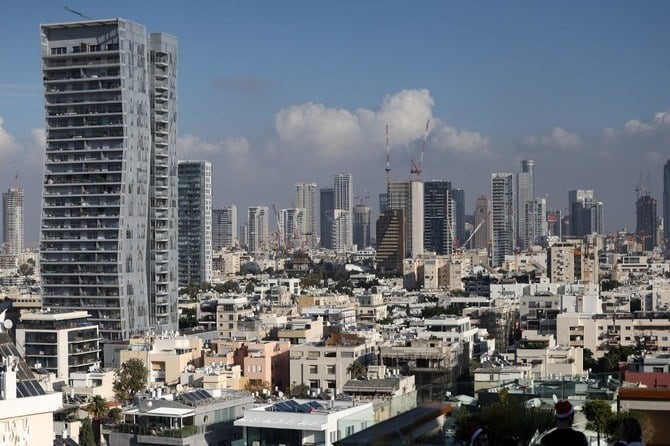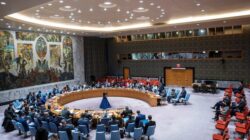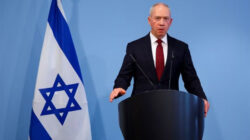JERUSALEM – When Israel agreed to establish diplomatic relations with the United Arab Emirates in 2020, it provided an electrifying sense of accomplishment to a country that had long been marginalized in the Middle East.
Officials insisted that Israel’s new ties with the UAE, and soon after with Bahrain, would go beyond governments and into societal pacts, fostering mass tourism and friendly exchanges between people who had previously been at odds.
However, in the two years since the historic agreements, the expected flood of Gulf Arab tourists to Israel has been little more than a trickle. Although more than 500,000 Israelis have visited oil-rich Abu Dhabi and skyscraper-studded Dubai, only 1,600 Emirati citizens have visited Israel since coronavirus travel restrictions were lifted last year, according to the Israeli Tourism Ministry.
The ministry does not know how many Bahrainis have visited Israel because “the numbers are too small,” according to the ministry.
“It’s still a very strange and sensitive situation,” said Mursi Hija, the head of Israel’s forum for Arabic-speaking tour guides. “The Emiratis believe they did something wrong by coming here.”
According to experts, the lack of Emirati and Bahraini tourists reflects Israel’s long-standing image problem in the Arab world and reveals the limits of the Abraham Accords.
Despite the fact that bilateral trade between Israel and the UAE has increased from $11.2 million in 2019 to $1.2 billion last year, according to a survey conducted by the Washington Institute for Near East Policy, the popularity of the agreements in the UAE and Bahrain has plummeted since the agreements were signed.
In the UAE, support has dropped from 47 percent to 25 percent in the last two years. In Bahrain, only 20% of the population supports the agreement, down from 45% in 2020. At the time, Israel and Gaza militants were engaged in a devastating war, and violence in the occupied West Bank reached unprecedented levels.
According to Israeli officials, the missing piece that would take the agreements beyond security and diplomatic ties is Gulf Arab tourism to Israel. Tourists from Egypt and Jordan, the first two countries to reach peace with Israel, are also scarce.
“We need to persuade (Emiratis) to come for the first time. It’s a critical mission,” Amir Hayek, Israel’s ambassador to the UAE, told the Associated Press. “We need to promote tourism so that people can get to know and understand one another.”
Last month, Israeli tourism officials flew to the UAE in a marketing push to spread the word that Israel is a safe and appealing destination. The ministry stated that it is now promoting Tel Aviv, Israel’s commercial and entertainment center, as a major draw for Emiratis.
According to tour operators, betting on Jerusalem has so far backfired. The tumultuous situation in the contested city has turned off Emiratis and Bahrainis, some of whom have faced backlash from Palestinians who see normalization as a betrayal of their cause. The Arab world broadly supports the Palestinian struggle for independence from Israel.
“There is still a lot of hesitancy coming from the Arab world,” said Dan Feferman, director of Sharaka, an organization that promotes people-to-people exchanges between Israel and the Arab world. “They expect (Israel) to be a conflict zone and to face discrimination.” Sharaka said he struggled to find more Gulf Arab citizens interested in visiting Israel after leading two trips of Bahrainis and Emiratis.
When a group of Emirati and Bahraini social media influencers visited the Al Aqsa Mosque compound in 2020, they were spat on and pelted with shoes in Jerusalem’s Old City, according to Hija, their tour guide.
The grand mufti of Jerusalem, Sheikh Muhammad Ahmad Hussein, issued a religious edict against Emiratis visiting the mosque under Israeli supervision when another group of Emirati officials visited the flashpoint site accompanied by Israeli police.
Most Emiratis and Bahrainis who visit Israel say they avoid wearing their national dress and headscarves to avoid drawing attention to themselves.
The Islamic Waqf, which runs the mosque, declined to comment on the number of Emirati and Bahraini visitors and their treatment at the compound.
The Palestinians’ rage against the Emiratis is not limited to the holy esplanade. Emirati citizens visiting and studying in Israel report receiving frequent death threats and online harassment.
“Not everyone can handle the pressure,” said Sumaiiah Almehiri, a 31-year-old Emirati from Dubai studying nursing at Haifa University. “I did not succumb to the threats, but fear is preventing many Emiratis from going.”
Fear of anti-Arab racism in Israel may also deter Gulf Arabs. Last summer, Israeli police mistakenly arrested two Emirati tourists in Tel Aviv while looking for a criminal who committed a drive-by shooting. Some Emiratis have taken to social media to complain about being scrutinized by security officials at Israel’s Ben-Gurion Airport.
“If you bring them here and don’t treat them properly, they’ll never come back and will warn all their friends to stay away,” Hija explained.
Benjamin Netanyahu, who was re-elected to a sixth term as Prime Minister last week, has promised to strengthen ties with Bahrain, Morocco, the United Arab Emirates, and Sudan. Sudan’s formal ties remain elusive in the aftermath of a military coup and in the absence of a parliament to ratify its US-brokered normalization agreement with Israel.
As the chief architect of the agreements, Netanyahu hopes to broaden the circle of countries and reach a similar agreement with Saudi Arabia.
Experts are concerned that his new government, which is the most ultranationalist and religiously conservative in Israel’s history, will discourage Gulf Arab tourists and even jeopardize the agreements. His administration has promised to expand West Bank settlements and annex the entire territory, a step that was put on hold as a condition of the initial agreement with the UAE.
“We have reason to be concerned about any deterioration in relations,” said Moran Zaga, a Gulf Arab states expert at Israel’s University of Haifa.
So far, the Gulf Arab governments have provided no cause for concern.
At a national day celebration last month, the Emirati ambassador was photographed warmly embracing Itamar Ben-Gvir, one of the coalition’s most radical members. Over the weekend, Sheikh Mohammed bin Zayed Al Nahyan, the UAE’s ruler, called Netanyahu to congratulate him and invite him to visit.
It’s a different story for those who aren’t in government.
“I hope Netanyahu and those with him do not set foot on Emirates territory,” Abdulkhaleq Abdulla, a prominent Emirati political scientist, tweeted. “I believe it is appropriate to temporarily halt the Abraham Accords.”
Source: AP










